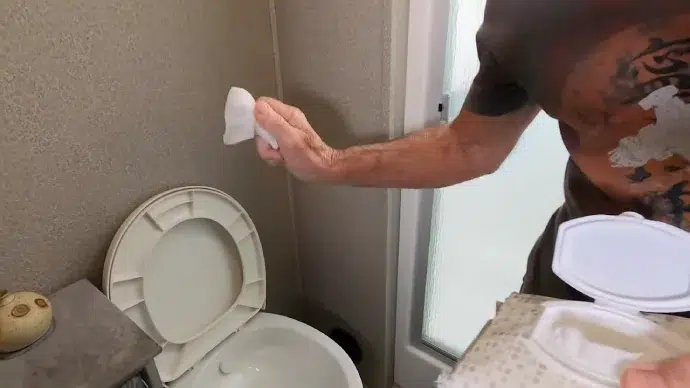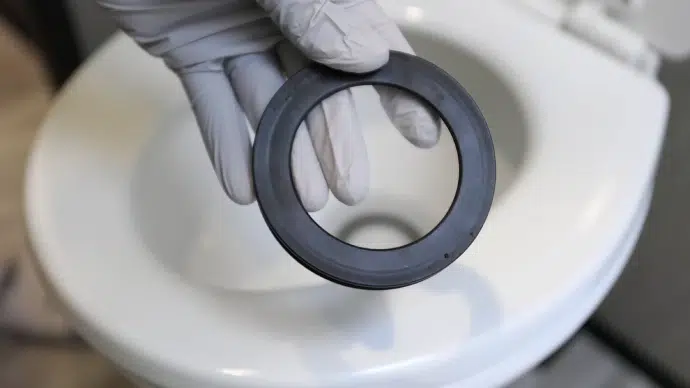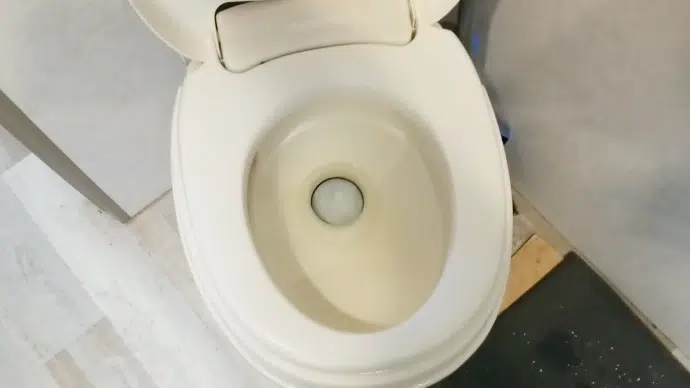Last Updated on May 23, 2023
If you are an RV owner, you may wonder whether using flushable wipes in your RV toilet is safe.
While these wipes may seem like a convenient option for maintaining cleanliness and hygiene on the road, flushable wipes are unsafe for your trusty recreational vehicle’s plumbing and black tank. So don’t give in to that temptation just yet.
Even with their design, using flushable wipes in an RV toilet can still pose some risks. One of the most significant risks is the potential for clogs and backups in the black water tank. Flushable wipes can accumulate in the tank and cause blockages that can be difficult and expensive to remove.
Let’s explore the potential hazards of flushing those magical wipes in your RV toilet and investigate other available solutions.
Can You Use Flushable Wipes in an RV Toilet: Risks
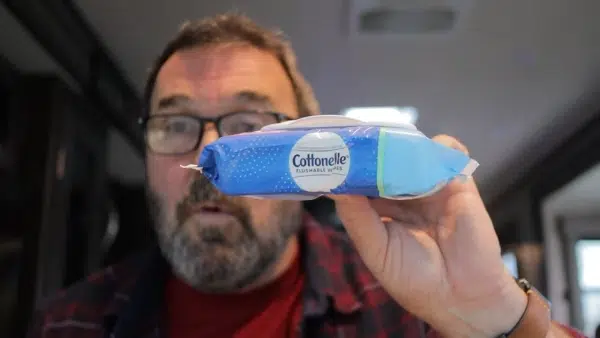
Flushable wipes in an RV toilet may seem convenient, but it’s not worth the risks. Don’t be tempted, there are plenty of negatives associated with using flushable wipes that you should consider before taking them on your next road trip. Here’s what the risk is:
Black Water Tank Could Clog And Back Up
One of the biggest hazards is black water backups and clogs. Flushable wipes are designed to break down easily, but they can still accumulate and cause blockages in the tank.
Unlike regular toilet paper, which dissolves quickly in water, flushable wipes can take longer to break down and may not fully disintegrate before reaching the tank. This can lead to clogs and backups that are hard and expensive to fix.
Environment and Sewer System Damage
Flushable wipes can also damage the sewer system and the environment. While these wipes are marketed as safe for flushing, they can still cause backups and clogs in the black water tank of your RV.
When flushed down an RV toilet, flushable wipes can accumulate in the black water tank, forming blockages that prevent proper drainage. This can result in costly repairs or even require the replacement of the entire sewage system.
Even if a flushable wipe manages to make it through the RV’s sewage system without causing a clog, it can still cause harm to the environment. Flushable wipes do not decompose as quickly as toilet paper and can pollute waterways or harm wildlife.
Alternatives to Putting Flushable Wipes In an RV Toilet
Say goodbye to flushable wipes and hello to alternative solutions for your RV toilet. While there is a huge risk in using the former, fear not. There are some incredibly safe and effective options out there. Let’s dive into what they are so you can keep things running smoothly on your adventures.
Use of RV-Specific Biodegradable Toilet Paper
Choosing the right type of toilet paper is important when using an RV toilet. Regular toilet paper can clog and back up the black water tank, leading to costly repairs. That’s why RV-specific biodegradable toilet paper is a great alternative.
This type of toilet paper is designed to break down easily and quickly in the sewage system, reducing the risk of clogs and backups. It’s also environmentally friendly, as it won’t harm the sewer system or pollute the environment.
When shopping for biodegradable toilet paper for your RV, look for products labeled specifically for RVs. These products are made with materials that are safe for your sewage system and won’t cause damage over time.
Pre-moistened Toilet Paper Instead of Flushable Wipes
Pre-moistened toilet paper is another suitable alternative to flushable wipes. It provides the same convenience without the risk of clogs and backups in your black water tank or damage to your sewer system and the environment.
Pre-moistened toilet paper is specifically designed for use in toilets and breaks down easily when flushed.
It’s important to note that not all pre-moistened toilet paper is created equal. Look for products that are labeled as safe for septic systems or RVs. These products will break down easily and won’t cause problems with your sewage system.
What should you do if your RV toilets clog after using flushable wipes?
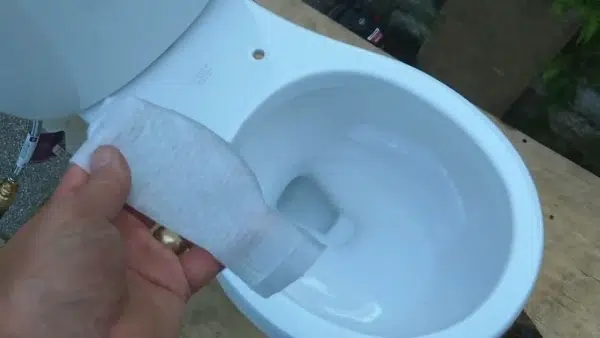
If your RV toilet is clogged after using flushable wipes, here are some steps you can take to unclog it:
Turn off the water supply to the toilet. This will prevent more water from entering the bowl and potentially overflowing.
Try using a plunger to clear the clog. If the clog is near the top of the bowl, a plunger might be enough to dislodge it. Be sure to use a plunger designed for RV toilets, as these are smaller and can create a better seal.
If the plunger doesn’t work, try using an auger. An auger, also called a plumber’s snake, can be used to clear clogs that are further down the pipe. Insert the auger into the toilet bowl and turn the handle to work it down the pipe. Be careful not to damage the toilet bowl or plumbing with the auger.
If the clog is still not cleared, you may need to call a professional plumber or RV repair service. They can use specialized equipment to locate and clear the clog.
What is the dissolving time of flushable wipes?
Flushable wipes take weeks to dissolve, and some may not fully disintegrate. This is because flushable wipes are made from materials that won’t degrade as easily as toilet paper, such as non-woven fibers and synthetic materials.
When flushed down the RV toilet, these materials can become entangled and form clumps, leading to clogs in the plumbing system. In addition, many flushable wipes contain chemicals and additives that can further slow down the dissolving process.
While some flushable wipes may eventually break down, they can take much longer than toilet paper, which is specifically designed to disintegrate quickly and easily in water. For this reason, it is generally recommended only to flush RV toilet paper in your toilet.
Can I use baby wipes or other non-flushable wipes in my RV toilet?
Using baby wipes or any non-flushable wipes in your RV toilet is not recommended. These wipes don’t dissolve in water easily and can cause clogs and backups in your RV’s plumbing system.
In addition, using these wipes can harm the environment if they get dumped in a wastewater treatment plant or in natural water sources.
Instead, it is recommended to use RV-specific toilet paper that dissolves easily in water and is safe for use in RVs. You can also consider using a bidet attachment or portable bidet to reduce your reliance on toilet paper and minimize the impact on your RV’s plumbing system.
How often should I clean my RV toilet?
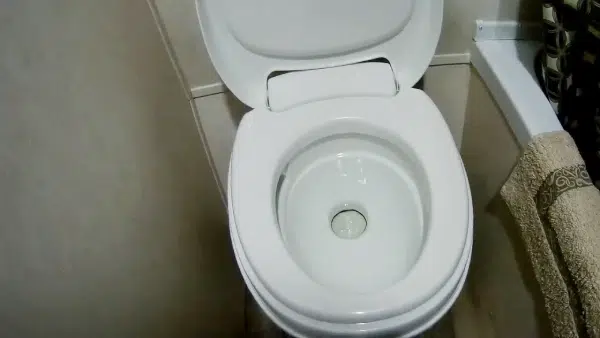
It is recommended to clean your RV toilet at least once a week or more frequently if it is heavily used. Regular cleaning will help prevent the buildup of waste, bacteria, and unpleasant odors and ensure that your RV toilet remains in good working order.
You can use a mild, non-abrasive cleaner specifically designed for RV toilets to clean your RV toilet. Avoid using harsh chemicals or abrasive scrubbers, as this damages the toilet’s surface and components.
You should also regularly empty your RV’s holding tank to prevent waste buildup and avoid overfilling the tank.
Your RV’s tank may need to be emptied every three to five days or when it reaches two-thirds or three-quarters full, depending on its size and how many people use it.
In addition to regular cleaning and maintenance, it’s a good idea to have a professional inspect and service your RV’s plumbing at least once a year to ensure everything’s working and catch any problems before they become more serious.
What are some tips for maintaining my RV toilet to prevent clogs?
Don’t let clogs stop your RV fun. Here are a few simple tricks for keeping your toilet trouble-free and ready to hit the road.
Use RV-specific toilet paper that’s water-soluble. Avoid using regular household toilet paper or other paper products, as these can cause clogs in your RV’s plumbing system.
Don’t put anything besides RV toilet paper and human waste in the toilet. Avoid flushing food scraps, paper towels, feminine hygiene products, or other non-degradable items down the toilet, as these can cause clogs.
Use plenty of water when flushing. RV toilets require more water than household toilets to ensure proper waste removal. Hold down the flush lever for several seconds to allow enough water to flow through the system.
Empty your RV’s holding tank regularly. Overfilling the tank can lead to clogs and backups in the plumbing system.
Use a toilet treatment product to help break down waste and prevent odors. These products contain enzymes that help dissolve waste and keep the plumbing system clean and odor-free.
Avoid using harsh chemicals or abrasive cleaning products. They damage toilet surfaces and plumbing parts and can pollute the environment when they enter natural water sources.
Have a professional check out your RV’s plumbing once a year to make sure everything is working properly and catching any issues before they become more serious.
Don’t Risk RV Toilets with Flushable Wipes: Biodegradable RV Toilet Paper Instead
In conclusion, using flushing wipes down the toilet is not recommended. While they may seem convenient and easy to use, the potential risks and damages outweigh their benefits.
Regular wipes are not made to dissolve in water easily, which can lead to blockages in the black water tank. This can result in costly repairs and damage to the sewer system and environment.
Instead of using flushable wipes, consider using biodegradable toilet paper specifically made for RVs or pre-moistened toilet paper as a suitable alternative. These options are easy to break down in the water and will not harm your sewage system or the environment.
Proper maintenance of your RV sewage system is also crucial in preventing clogs and backups. Be sure to empty the black water tank regularly, use digestive treatments to break down waste materials, and keep the system clean and debris-free.

